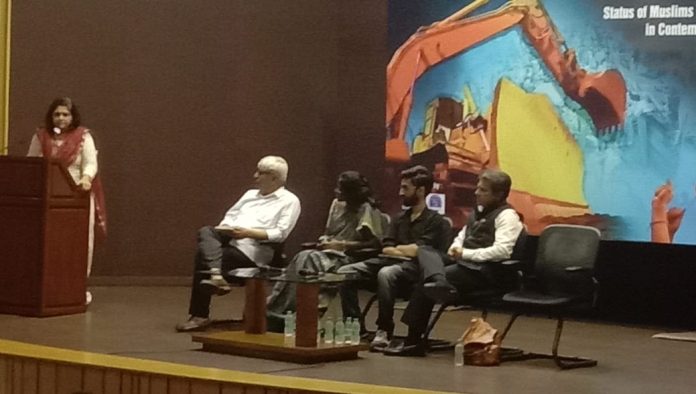
By Mohammed Naushad Khan
NEW DELHI: A gathering of prominent social and human rights activists, lawyers, journalists, academicians, and political leaders was held at Jawahar Bhawan here Saturday to discuss the growing challenges faced by religious minorities in India, particularly Muslims and Christians. The event, organized by ANHAD and the United Christian Forum, focused on the theme “The Quest for Equality and Justice,” examining the current status of these communities in contemporary India. The programme also paid tributes to CPI(M) Sitaram Yechury, recognizing his lifelong dedication to promoting equality and justice. Yechuri died two days ago.
John Dayal, veteran journalist and a leading human rights defender, set the tone of the conference. Dayal highlighted Yechury’s major contributions during his 12 years in the Rajya Sabha, where he advocated for religious minorities, especially Muslims and Christians. He pointed out that under both the first NDA government led by Atal Bihari Vajpayee and the current Modi regime, the laws and actions of the BJP-led government were designed to target the two religious minorities simultaneously. Dayal drew attention to the weaponization of anti-conversion laws, and the Uniform Civil Code, emphasizing how these measures have been used to suppress Christians and Muslims alike.
Dayal also reflected on the misuse of bulldozers as a tool of intimidation. While initially used against Christian schools, the tactic has now become a common form of punishment against the Muslim community. He stressed the importance of unity among Muslims, Christians, Dalits, Tribals, and OBCs, stating that they represent a powerful collective force capable of challenging BJP and the Modi government.
Minakshi Singh, a social activist, speaking about mob violence and lynching, underlined the persecution of both Christians and Muslims. She pointed to the ongoing violence in Manipur, where the government’s inaction, including the prime minister’s failure to visit the state, reflects its complicity in the crisis.
Harsh Mander, founder of Karwan-e-Mohabbat and a former district collector, condemned the use of bulldozers to intimidate Muslims, stating that such actions violate the principles of civilized governance. He emphasized that the response to this state-backed hate must be non-violent and rooted in love.
This story was originally published in indiatomorrow.net. Read the full story here.

